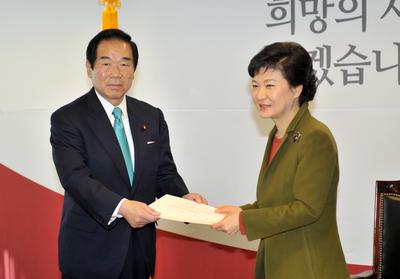Yet the LDP’s share of the popular vote was lower than its seat count would suggest, with 43.01 per cent of the local constituency votes and only 27.79 per cent of the proportional block votes. The LDP’s large-scale victory in December is therefore still standing upon fragile ground.
When Shinzo Abe was handed over the LDP’s leadership in 2006, the LDP similarly dominated the lower house with 296 seats. Yet the LDP’s downfall began during the Abe administration when the LDP and its coalition lost their majority in the upper house after the 2007 election. Since then the ‘twisted Diet’, where the ruling party does not have a majority in the upper house, has constantly plagued Japan’s legislative process, leading to a long-term gridlock and deficiencies in key decision-making.
The upper house election in July 2013 is a critically important opportunity for the LDP-led government to gain power over both houses. The July election result will determine whether Japanese politics can transform from its vicious cycle of short-term unstable leadership to longer-term governance.
The revival of Shinzo Abe as prime minister was not taken for granted, but neither was it a long-awaited come back. He won the LDP presidential election in September 2012 by a narrow margin. Abe was also not at the top of public opinion polls for preferred Prime Minister until recently. Abe’s position as a leader in the LDP hierarchy is also yet to be consolidated. So viewing Abe’s revival as an indication of Japan’s rightward trend, as many foreign correspondences tend to claim, may be wrong.
The LDP’s return to power coincided with heavy criticism of the DPJ’s foreign policy balance sheet, and with the Japanese public’s unprecedented frustration and anxiety over Japan’s external environment. In the past three years, contested territorial claims over the Senkaku/Diaoyu islands, Takeshima/Dokdo island and Northern Territories have repeatedly deteriorated bilateral relations with China, Korea and Russia. As China exceeded Japan’s GDP in 2010, the anxiety over the power transition in Japan has been acutely expressed in Japanese political discourse.
As a result, during their campaign, the LDP’s Policy Statement called for the ‘revival of Japan’s diplomacy’ and listed 38 items of detailed policy agenda regarding ‘diplomacy’, ‘security’ and ‘territory and sovereignty’ in the so-called ‘J-File’ — a significant increase from the 24 items in the 2009 election. Highlights of these agenda items included: the establishment of the National Security Council, enabling exercise of the right to collective self-defense, reinforcement of the Self-Defense Forces and enhancing territorial defence and maritime security. The agenda also included hard-liner assertions such as upgrading ‘Takeshima Day’ into a government-sponsored ceremony, and permanent stationing of government officials at Senkaku/Diaoyu islands.
However Abe is taking cautious and moderate steps by compromising on his ideological agenda with regard to foreign policy. Immediately after the South Korean presidential election on 19 December 2012, Abe suggested sending his private envoy to President-elect Park Geun-hye in order to resume Japan–Korea bilateral relations. The LDP executive also indicated that it would not sponsor an event to mark Takeshima Day despite its campaign promise. Abe is also softening his stance toward the Yasukuni Shrine, and has so far avoided providing any indication that he will visit it for the next Spring Festival. As for the Senkaku/Diaoyu islands territorial dispute in the South China Sea, Abe mentioned that ‘the idea [of stationing government officials] is one of the options when we negotiate with China’. These are important indicators that the Abe administration will be focusing on more pragmatic and less ideological foreign policy orientations in 2013.
The current Abe administration is yet to formulate a long-term foreign policy. It was during the former Abe administration in 2006 when ‘value-driven diplomacy’ and the concept of the ‘Arc of Freedom and Prosperity’ were proclaimed by then Foreign Minister Taro Aso. Yet these concepts did not hold weight in Japan’s foreign policy circles due to their black and white terminology, favouring of ideologically like-minded states and the noticeable lack of a strategic approach to China. The dynamic slogans were quickly diminished after Abe’s resignation. This experience should remind Abe to be cautious in bringing his ideological views into Japan’s international relations.
If pragmatism prevails in Abe’s foreign policy orientations, Japan has high potential to expand its diplomatic profile. It was during the Abe administration in 2006–7 that Japan broke through the diplomatic standoff with China to lead the ‘mutually beneficial relationship based on common strategic interests’. Abe’s diplomatic outreach also sought to extend Japan’s strategic partnerships to India, Australia, Korea, ASEAN and NATO. When the LDP assumes longer-term governance in Japanese politics, the pragmatic Abe has considerable potential to be a powerful leader and to promote Japan’s proactive engagement in the Asia Pacific and beyond.
Ken Jimbo is Associate Professor at the Faculty of Policy Management, Keio University, Japan.
This is part of a special feature on 2012 in review and the year ahead.


While the Abe government’s foreign policy agenda remains to be formulated, Mr. Abe’s inclinations (unfortunately) remain unchanged. The ‘Arc’ has given way to a ‘Diamond’ but the values component remains just the same.
http://www.project-syndicate.org/commentary/a-strategic-alliance-for-japan-and-india-by-shinzo-abe
Worse, in inviting the strategic participation of Britain and France once again (see article), he appears to be hankering for an Asian security system in this age of Asia’s rise that is underwritten, ironically, mostly by non-Asians. This is neither wise nor realistic.
Sourabh